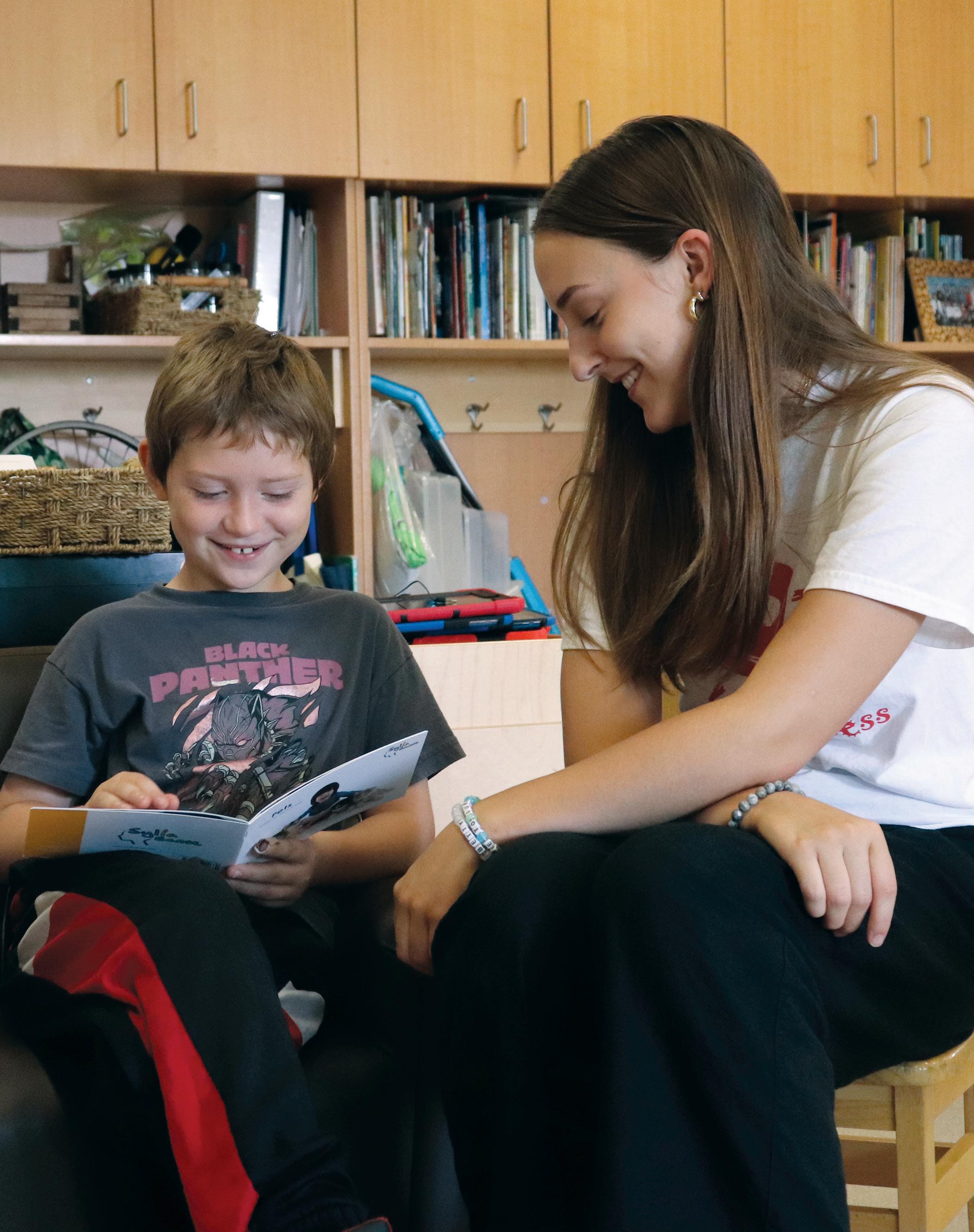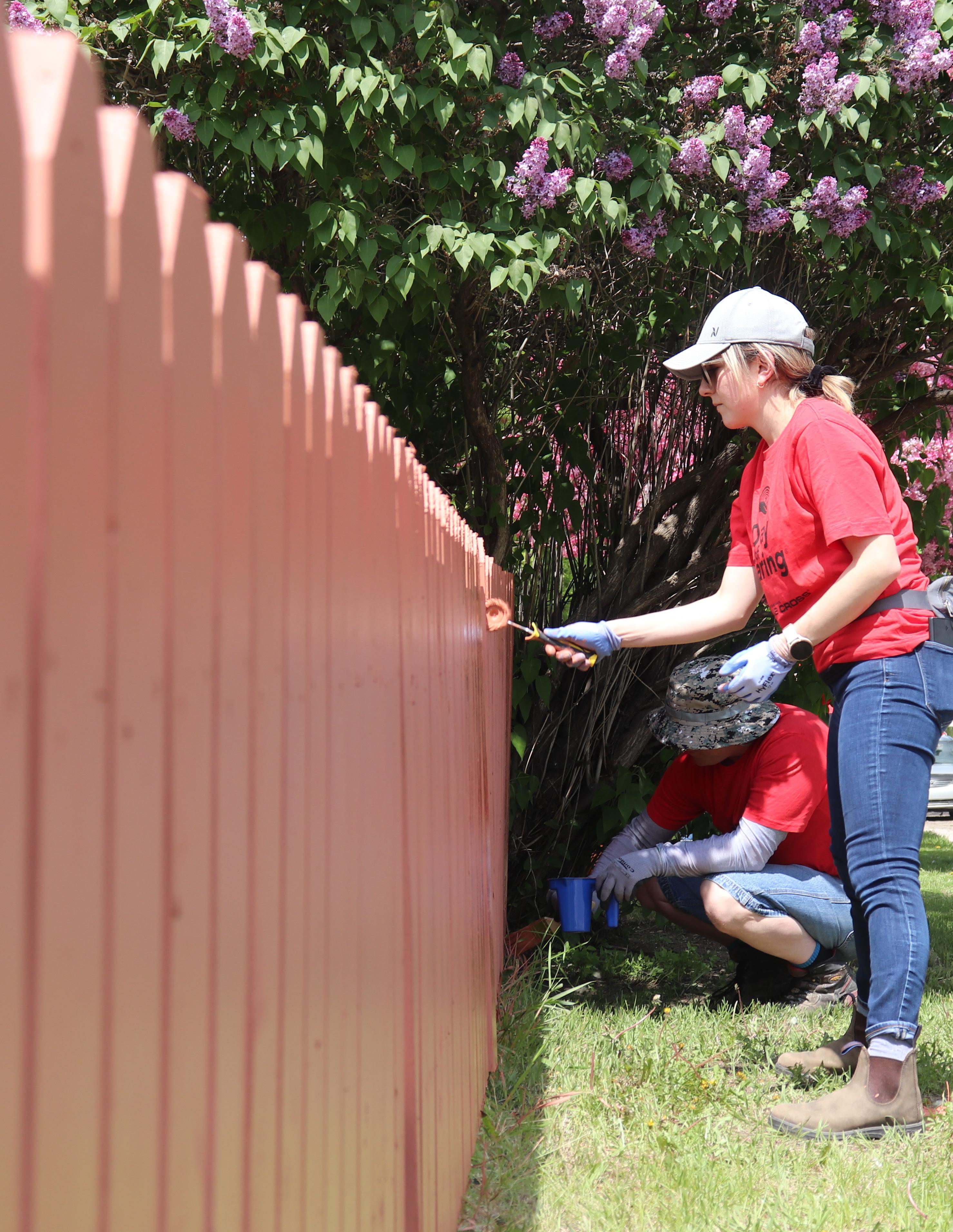






65 years of making life better for everyone in our communities
This year’s Annual General Meeting will be United Way Saskatoon and Area’s 65th and that means the organization is entering its 65th year serving our communities. It’s a significant milestone, and one that we – as stewards of this important community asset – don’t take lightly.
For sixty-five years, United Way has been providing leadership, investment, and driving change in Saskatoon and area. Each year, volunteers and donors bring their energy, passion, and creativity to raise millions of dollars to invest in creating opportunities for everyone in our communities to realize their full potential.
What each of you achieve as United Way volunteers and donors is as inspiring as it is important for the safety and wellbeing of everyone in our communities. And this work has never been more important than it is today. So, from the board and staff of United Way, thank you.
Powered by volunteers and donors like you
United Way is committed to leading the way on solving our communities’ most complex social challenges, and your participation makes us stronger, smarter, and more effective. As a volunteer led and powered organization, volunteer participation is essential to the outcomes United Way produces, and the more United Way
volunteers that participate in United Way initiatives, the better the organization does and the greater the impact.
This past year, United Way had over 4000 volunteers and donors working together to create stronger, healthier communities. This generous group of community leaders invested over $5.3 million dollars into 42 initiatives, including 35 community-based organizations. They have also taken time out of busy days to build infrastructure for community service organizations, paint rooms and hallways in shelters, serve and cook food for those without a meal, and collect and distribute essential items for our most vulnerable neighbours.
From financial literacy courses to providing meals and legal representation and employment opportunities for people experiencing challenges in mental health, substance use, or poverty, United Way is a catalyst for change and the driving force behind numerous community-building initiatives.
Almost 400 kids had a safe place to learn and grow before and after school. Over 100 participated in summer literacy camps. United Way had the honour of sponsoring an entertainment space in a youth group home called Garden of Hope, which was designed by youth with lived experience. Dozens of folks with complex needs gained access to housing. Thanks to your support, United Way made a significant contribution to the expansion of YWCA’s shelter for women and children, investing $100,000 into the development of an “auntie” room, which will provide cultural support for the women.
And all these initiatives are powered by volunteers and donors like you. Thank you.
The past year has been a humbling and challenging year. The devastating combination of an affordability crisis and simultaneous homelessness, opioid and HIV epidemics all happening at the same time have led to an exponential increase in demand for community support services in our local communities. This demand has placed incredible strain on community-based agencies’ finances and the staff and volunteers powering these support services.
While there has been funding support from various levels of government, the tide is rising faster than these agencies have been able to adapt to it. The result is increasing absences and burnout from community-based agencies’ staff and financial instability. It is an unsustainable trajectory and visible indicators, like camps and individuals roughing it on the street, will continue to grow without key stakeholders working together to find a sustainable solution – a sustainable solution that works for everyone, especially those with lived experience. Now more than ever, we need to work together, united. A united way forward is the only path that leads to overcoming these challenges.
To provide extra support to our community-based partners, the United Way board of directors approved over $300,000 in reserve funds to be distributed to six struggling community-based organizations. This emergency funding was used to help ensure critical services continued to be available despite trying times.
At times like these, United Way as an organization and community asset has never been more valuable. And yet, this past year, United Way campaigns missed their goal of raising $4 million. This too was humbling. But it is also a call to action.
A reminder of the importance of volunteer and donor stewardship and the organization’s role as catalyst and connector in the community, providing value beyond financial support, weaving together supports, services and key stakeholders to tackle critical issues in our community.
That is why, in 2024-25, United Way as an organization and volunteer-driven community asset is going to take on the financial risk of continuing our funding levels to our funded agencies despite not having hit our fundraising goal. Now is not the time to abandon our friends on the frontlines. Thanks to years of excellent financial stewardship, United Way has the capacity to pull funds from reserves to finance this support in 2024. And that’s what we should do because it’s the right thing to do at this time.
But that too is unsustainable.
That is also why, going forward, United Way will very carefully align resources and investment to grow our impact even further. Leadership at United Way will be renewing relationships with volunteers, donors and critical stakeholders throughout the community and beyond. The organization will be investing in internal capacity, scaling our efforts through better technology and processes, while developing best-in-class volunteer and donor stewardship. These efforts will grow and diversify revenue both in the short term and renew United Way’s presence in our community over the long term, reaffirming our stability, resilience, and value.
The leadership of United Way is asking everyone in our communities to step up as partners,
sponsors, volunteers, and donors to meet these growing challenges head on. United Way is a critical community asset and the only way we scale with agility and resilience is through participating in our community, being a catalyst for change, and ensuring everyone in our communities have opportunities to realize their full potential.
Everyone does better when we all do better. Thank you for your ongoing support.
Darla
and Sheri


Sheri Benson CEO


Darla Deguire Chair, Board of Directors
Darla Deguire
Founder and Lead Curator, Cedar & Sage Boutique Retreat
Fern Boutin
Senior Director, Potash Operational Risk Management, Nutrien
Lucia Flack Figueiredo
President, United Food and Commercial Workers Local 1400
Melissa Kraft
Director of Financial Operations, SIIT
Daryl Schatz
Regional Director, Department of Justice Canada
Rachel Loewen Walker
Assistant Professor, Women’s and Gender Studies and Political Studies, University of Saskatchewan
Benson Thoudsanikone CFO, Curtis Industries*
*Stepped down prior to end of term

Kurt Wintermute Partner, MLT Aikins LLP
Kara Leftley
Human Resources Consultant, Saskatchewan Polytechnic
Jason Prokopchuk
President, United Steelworkers Local 7689
Julia Ewing Manager Community Engagement Consultant, Uranium Energy Corp
Shauna Wilkinson
Vice-President, People and Culture, Federated Co-operatives Limited
Trina Erickson
Health Educator, First Nations and Metis Health, Saskatchewan Health Authority
Myrna Hewitt
Retired Senior Executive*
EXECUTIVE:
Chair: Darla Deguire
Vice Chair: Kurt Wintermute
Treasurer: Melissa Kraft
RISK & AUDIT COMMITTEE
Melissa Kraft - Treasurer & Chair
Darla Deguire
Daryl Schatz
Fern Boutin
Daphne Arnason (Member at Large)
GOVERNANCE & NOMINATIONS COMMITTEE
Rachel Loewen Walker - Chair
Julia Ewing
Kurt Wintermute
Shauna Wilkinson
Trina Kaal

LABOUR ADVISORY COMMITTEE
Jason Prokopchuk - Chair
Lucia Flack Figueiredo
Past Chair: Kara Leftley
Chief Executive Officer: Sheri Benson
INDIGENOUS LEADERSHIP CIRCLE
Cornelia Laliberte - Chair
Colleen Cameron
Darla Deguire
Darren McKee
Harvey Thunderchild
Kristin Francis
Nancy Amyotte
Priscilla Johnstone
Tamara McKay
SASKATOON COMMUNITY SERVICE
VILLAGE BOARD OF DIRECTORS
Daryl Schatz
Sheri Benson
GROWTH COMMITTEE
Kara Leftley
Kurt Wintermute
Jason Prokopchuk
I am pleased to provide 2023-2024 financial highlights for United Way Saskatoon and Area (United Way) for the year ending March 31, 2024.
Through your generosity, United Way raised $5.4M of revenue and invested nearly $5.3M into Saskatoon and Area. Thank you for playing a critical role in ensuring everyone in our communities has the opportunity to realize their full potential.
Your donation of time and money, combined with thousands of other United Way community leaders, provided critical funding to local programs and initiatives focused on our communities’ greatest challenges. This investment created a safe space for young children to play and learn, provided a home for someone without, offered sanctuary for a woman or child threated with violence, brought essential information to a person in need of a handup, and much more.
Some highlights include:
$1.7M invested into increasing digital capacity and infrastructure for dozens of community-based organizations thanks to the Government of Canada Community Services Recovery Fund.
$2M directly invested into 32 local agencies whose work in the community ensures kids, youth, women, and other vulnerable populations have access to vital services and opportunities to fully participate in and contribute to safer, stronger local communities.
$1M additional investment in initiatives such as:
- Journey Home, a home and wrap around support for the unhoused. The program is delivered by Saskatoon Crisis Intervention Services.
- 211 Saskatchewan, an essential service for people in need of non-emergency support.
- Summer Success literacy camps for students in grades 2 and 3 at risk of falling behind at this critical age.
$392K directed to additional charitable organizations locally and across Canada.
During the 2023-2024 fiscal year, the organization recorded a deficit. Reserves will be used in the coming fiscal year so that the deficit is not carried forward to next year.
Thanks to excellent financial stewardship, United Way continues to be a key community partner and invests in vital community services and programs contributing to the wellbeing and safety of our communities. We could not do this without your support. Thank you to the thousands of United Way donors and volunteers making our communities better for everyone.
Thank you also to KPMG for their service and support throughout the audit process.


Melissa Kraft Treasurer United Way Board of Directors
And Independent Auditor's Report thereon
Year ended March 31, 2024
KPMG LLP
500-475 2nd Avenue South Saskatoon SaskatchewanS7K 1P4
Canada
Tel (306) 934-6200
Fax (306) 934-6233
To the Members of United Way of Saskatoon and Area:
We have audited the financial statements of United Way of Saskatoon and Area (the Entity), which comprise:
the statement of financial position as at March 31, 2024
the statement of operations for the year then ended
the statement of changes in net assets for the year then ended
the statement of cash flows for the year then ended
and notes to the financial statements, including a summary of significant accounting policies (Hereinafter referred to as the ''financial statements'').
In our opinion, the accompanying financial statements present fairly, in all material respects, the financial position of the Entity as at March 31, 2024, and its results of operations and its cash flows for the year then ended in accordance with Canadian accounting standards for not-for-profit organizations.
We conducted our audit in accordance with Canadian generally accepted auditing standards. Our responsibilities under those standards are further described in the ''Auditor’s Responsibilities for the Audit of the Financial Statements'' section of our auditor’s report.
We are independent of the Entity in accordance with the ethical requirements that are relevant to our audit of the financial statements in Canada and we have fulfilled our other ethical responsibilities in accordance with these requirements.
We believe that the audit evidence we have obtained is sufficient and appropriate to provide a basis for our opinion.
of Management and Those Charged With Governance for the Financial Statements
Management is responsible for the preparation and fair presentation of the financial statements in accordance with Canadian accounting standards for not-for-profit organizations, and for such internal control as management determines is necessary to enable the preparation of financial statements that are free from material misstatement, whether due to fraud or error.
In preparing the financial statements, management is responsible for assessing the Entity's ability to continue as a going concern, disclosing, as applicable, matters related to going concern and using the going concern basis of accounting unless management either intends to liquidate the Entity or to cease operations, or has no realistic alternative but to do so.
Those charged with governance are responsible for overseeing the Entity's financial reporting process.
Our objectives are to obtain reasonable assurance about whether the financial statements as a whole are free from material misstatement, whether due to fraud or error, and to issue an auditors' report that includes our opinion.
Reasonable assurance is a high level of assurance, but is not a guarantee that an audit conducted in accordance with Canadian generally accepted auditing standards will always detect a material misstatement when it exists.
Misstatements can arise from fraud or error and are considered material if, individually or in the aggregate, they could reasonably be expected to influence the economic decisions of users taken on the basis of the financial statements.
As part of an audit in accordance with Canadian generally accepted auditing standards, we exercise professional judgment and maintain professional skepticism throughout the audit.
We also:
Identify and assess the risks of material misstatement of the financial statements, whether due to fraud or error, design and perform audit procedures responsive to those risks, and obtain audit evidence that is sufficient and appropriate to provide a basis for our opinion.
The risk of not detecting a material misstatement resulting from fraud is higher than for one resulting from error, as fraud may involve collusion, forgery, intentional omissions, misrepresentations, or the override of internal control.
Obtain an understanding of internal control relevant to the audit in order to design audit procedures that are appropriate in the circumstances, but not for the purpose of expressing an opinion on the effectiveness of the Entity's internal control.
Evaluate the appropriateness of accounting policies used and the reasonableness of accounting estimates and related disclosures made by management.
Conclude on the appropriateness of management's use of the going concern basis of accounting and, based on the audit evidence obtained, whether a material uncertainty exists related to events or conditions that may cast significant doubt on the Entity's ability to continue as a going concern. If we conclude that a material uncertainty exists, we are required to draw attention in our auditor’s report to the related disclosures in the financial statements or, if such disclosures are inadequate, to modify our opinion. Our conclusions are based on the audit evidence obtained up to the date of our auditor’s report. However, future events or conditions may cause the Entity's to cease to continue as a going concern.
Evaluate the overall presentation, structure and content of the financial statements, including the disclosures, and whether the financial statements represent the underlying transactions and events in a manner that achieves fair presentation.
Communicate with those charged with governance regarding, among other matters, the planned scope and timing of the audit and significant audit findings, including any significant deficiencies in internal control that we identify during our audit.
Chartered Professional Accountants
Saskatoon, Canada
May 29, 2024
Statement of Financial Position
March 31, 2024, with comparative information for 2023
Liabilities and Net Assets
Commitments (note 3 and 7)
See accompanying notes to the financial statements.
Approved on behalf of the Board:


Statement of Revenue and Expenses
Year ended March 31, 2024, with comparative information for 2023
See accompanying notes to the financial statements.
Statement of Changes in Net Assets
Year ended March 31, 2024, with comparative information for 2023
31, 2024
$3,122,317
See accompanying notes to the financial statements.
Statement of Cash Flows
Year ended March 31, 2024, with comparative information for 2023
See accompanying notes to the financial statements.
Notes to the Financial Statements
Year ended March 31, 2024
United Way of Saskatoon and Area (“United Way”) is incorporated without share capital as a nonprofit organization under the laws of the Province of Saskatchewan. Its mission is to improve lives and build community by engaging individuals and mobilizing collective action.
As a registered charitable organization under the Income Tax Act (Canada), United Way is exempt from income taxes and is able to issue charitable donation receipts for income tax purposes.
1. Significant accounting policies:
The financial statements have been prepared by management in accordance with Canadian Accounting Standards for not-for-profit organizations in Part III of the Chartered Professional Accountants Canada Handbook.
(a)Revenue recognition:
United Way follows the deferral method of accounting for campaign revenue. Non-designated campaign contributions are recognized as revenue in the period the contribution is receive d or receivable. A provision for uncollectible pledges is recorded to reduce pledges receivable and revenue.
Campaign contributions where the donor has directed that the funds be allocated to a registered charity are initially recorded as deferred revenue. Upon payment of the funds to the registered charity, the payment is recognized as an expense and the contribution is recognized as revenue. Administration fees related to donor directed contributions are recognized in the period the payment is made to the registered charity.
Grants and externally restricted contributions are recognized as revenue in the year which the related expenses are recognized. Grants approved but not received at the end of an accounting period are accrued. Where a portion of a grant relates to a future period, it is deferred and recognized as revenue in that subsequent period.
Interest revenue is recognized as revenue when earned. Conference revenue is recognized as revenue when the related services have been provided and the collection is reasonably assured. Other revenue including revenue from fees, contracts and registration fees are recognized when the services are provided.
(b) Cash and cash equivalents and short-term investments:
Cash and cash equivalents include cash on hand and short-term investments held at financial institutions which are highly liquid with original maturities of less than three months. Any investments with a period of maturity over 3 months but within 12 months are classified as short-term investments.
Notes to the Financial Statements
Year ended March 31, 2024
1. Significant accounting policies (continued):
(c)Pledges receivable:
Contribution pledges are recorded as receivable when the amount can be reasonably estimated and ultimate collection is reasonably assured. Allowances are provided for amounts estimated to be uncollectible.
(d) Joint projects:
The investment in 211 Saskatchewan which is jointly owned and controlled by United Wa y of Saskatoon and Area and United Way of Regina is accounted for using the equity method.
(e)Capital assets:
Capital assets are recorded at cost. Repairs and maintenance costs are expensed. When a capital asset no longer contributes to United Way’s ability to provide services, its carrying amount is written down to its residual value.
Capital assets are amortized over their estimated useful lives using the following methods and annual rates:
Capital assets are not subject to amortization until they are substantially complete and available for their intended use.
(f) Donated goods and services:
Goods and services contributed to United Way to be consumed in operations are not recorded as revenue or expenses due to the difficulty of determining the fair value.
Notes to the Financial Statements
Year ended March 31, 2024
1. Significant accounting policies (continued):
(g) Measurement uncertainty:
The preparation of financial statements in accordance with Canadian Accounting Standards for not-for-profit organizations requires management to make estimates and assumptions that affect the reported amounts of assets and liabilities and the disclosure of contingent assets and liabilities at the date of the financial statements and the reported amount of revenue and expenses during the year. Significant items subject to such estimates and assumptions include the provision for uncollectible pledges, accrued liabilities and the allocation of operating expenses. Actual results could differ from these estimates.
(h) Financial instruments:
Financial instruments are recorded at fair value on initial recognition. Equity instruments that are quoted in an active market are subsequently measured at fair value. All other financial instruments are recorded at cost or amortized cost unless management has elected to carry the instruments at fair value. United Way has not elected to carry any such financial instruments at fair value.
Transaction costs incurred on the acquisition of financial instruments measured subsequently at fair value are expensed as incurred. The costs of all other financial instruments are adjusted by transaction costs incurred on acquisition and financing costs, which are amortized using the straight-line method.
With respect to financial assets measured at cost or amortized cost, United Way recognizes in excess of revenue over expenses an impairment loss, if any, when it determines that a significant adverse change has occurred during the period in the expected timing or amount of future cash flows. When the extent of impairment of a previously written down asset decreases and the decrease can be related to an event occurring after the impairment was recognized, the previously recognized impairment loss is reversed in excess of revenue over expenses in the period the reversal occurs not exceeding the initial carrying value.
(i) Allocation of operating expenses:
Operating expenses are incurred to support functional areas and are allocated to fundraising and community services and initiatives expenses based on a time study method. Following this method, operating expenses are allocated as follows: 2024 2023
Notes to the Financial Statements
Year ended March 31, 2024
1. Significant accounting policies (continued):
(j) Restriction on net assets:
The operating reserve represents funds that the Board of Directors has internally restricted to be used by United Way in periods of financial uncertainty. Pursuant to United Way’s internal policies, the operating reserve is to be maintained at an amount between three to six months of operating expenses. The policy requires that at least 80% of the reserve be funded by way of cash or other liquid short-term investments.
The community investment reserve represents funds that the Board of Directors has internally restricted to be used with respect to community investment and building for the future through United Way programs. The specific use of the reserve is at the discretion of the Board of Directors. There are two components to the community investment reserve. The first component is the amount of $1,208,070 that has been committed for various community investment activities (note 14). The second component is the amount of $329,918 that has been set aside as a source of stabilization for the United Way to carry out its general mandate of future investment in the community
The capital and systems replacement reserve represents funds that the Board of Directors has internally restricted for the replacement of capital assets and related expenses.
Equity invested in capital assets represents the unamortized cost of capital assets. Adjustments to the reserve are made for additions, disposals and amortization of capital assets.
(k)Government assistance:
Government assistance related to current revenue and expenses is included in the determination of excess of revenue over expenses for the period. Amounts relating to future periods are deferred and recognized when the related expenditures are incurred.
Notes to the Financial Statements
Year ended March 31, 2024
2.Pledges receivable:
3. Investment in 211 Saskatchewan:
211 Saskatchewan is a database which allows internet, text and phone users to access a full range of community, social, government and health services within the province of Saskatchewan.
United Way has an agreement with United Way of Regina relating to 211 Saskatchewan and has agreed to pay 50% of all annual costs, associated with the development and operation of the database. United Way's share of these costs is expected to approximate $150,000 per year. The current agreement is in effect until October 31, 2024 or until such time it is extended.
United Way’s contributions and share of net expenses of 211 Saskatchewan for the period from April 1, 2023 to March 31, 2024 are summarized as follows:
Notes to the Financial Statements
Year ended March 31, 2024
4.Capital assets:
In the year ended March 31, 2024, United Way has assessed for full and partial impairment on capital assets and determined there are none.
5. Obligations under funding agreements:
United Way has entered into five-year funding agreements with 11 agencies. These multi-year agreements have been extended for a fifth year. Under these funding agreements, United Way’s allocation liabilities are $709,000 between April 1, 2024 and March 31, 2025 (2023 - $684,000 between April 1, 2023 and March 31, 2024).
6.Deferred revenue:
Notes to the Financial Statements
Year ended March 31, 2024
7.Commitments:
United Way is committed to future payments under an operating lease for office space through April 30, 2028 and an operating lease for equipment through July 31, 2025.
Future minimum payments, by year and in aggregate, under these commitments, consisted of the following at March 31, 2024:
8. Government of Canada Community Services Recovery Fund (CSRF):
$ 198,773
In the prior year, the Government of Canada, through Employment and Social Development Canada (ESDC), along with United Way Centraide Canada (UWCC), Community Foundations of Canada (CFC), and the Canadian Red Cross (CRC) developed and launched the Community Services Recovery Fund (CSRF)
CSRF is focused on supporting an organization, sector, or system to recover, renew, and repair from COVID-19 pandemic impact and to support medium and long-term recovery efforts. United Way of Saskatoon and Area received the funding amount in the current year and distributed funds to various community partners both charitable organizations and nonprofits as required by a formal signed agreement in central and northern Saskatchewan. As of March 31, 2024, there is $79,440 of the administrative allocation which remains unexpended and is included in deferred revenue as program grants (note 6).
Notes to the Financial Statements
Year ended March 31, 2024
9. Other revenue:
Saskatoon Survivors’ Circle projects (schedule 2) $ 132,035 $ 103,031
21,815 13,710
Wicihitowin Indigenous Engagement Conference (schedule 2) - 343,039
program - 60,000 $ 153,850 $ 519,780
10. Donor directed giving:
Campaign contributions include donor directed giving in the amount of $416,508 (2023 - $456,510) of which $392,395 (2023 - $429,408) (net of administration fees) has been paid to registered charities in Canada pursuant to donor requests.
11. Financial risk management:
United Way’s financial risks are as follows:
a) Interest rate risk:
United Way is exposed to interest rate risk arising from fluctuations in interest rates on amounts invested in interest bearing cash and cash equivalents and short-term investments with interest based on prime rates.
b) Credit risk:
United Way is exposed to credit risk to the extent that its donors may experience financial difficulty and would be unable to meet their pledge obligations. However, United Way has a large number of donors, which mitigates the concentration of credit risk. United Way assesses, on a continuous basis, pledges receivable and provides for any amount that is not collectible in the allowance for uncollectible pledges receivable.
Notes to the Financial Statements
Year ended March 31, 2024
11. Financial risk management (continued):
c)Liquidity risk:
Liquidity risk is the risk that United Way will be unable to fulfill its obligations on a timely basis or at a reasonable cost. United Way manages its liquidity risk by monitoring its operating requirements. United Way prepares and monitors a budget to ensure it has sufficient funds to fulfill its obligations. Cash flow forecasts are regularly monitored by the Audit and Finance Committee. United Way has access to a revolving demand credit facility up to a maximum of $100,000 which can be utilized for general working capital purposes; however, no funds have been drawn to date. Trade accounts payable and accrued liabilities are generally repaid within 30 days.
d) Fair values:
The fair value of cash, accounts receivable, and accounts payable and accrued liabilities approximate their carrying value due to the immediate or short-term period to maturity.
12.Transparency, accountability and financial reporting:
United Way follows the reporting guidelines as outlined in its membership agreement with United Way Centraide Canada. As part of these guidelines, each member calculates fundraising and allocation ratios. These ratios are summarized as follows:
Notes to the Financial Statements
Year ended March 31, 2024
13. Community investment reserve:
The community investment reserve is comprised of the following:
(i)United Way has agreed to provide up to $462,000 between April 1, 2024 and March 31, 2025 of grant funding to Saskatoon Crisis Intervention Service (“SCIS”). This will allow SCIS to continue to provide services under the Journey Home Program which supports and moves people from homelessness directly into housing without any barriers to entry such as sobriety or employment.
(ii)United Way has agreed to provide up to $525,000 between April 1, 2024 and March 31, 2025 of Community Initiatives Fund grant funding. The focus of United Way of Saskatoon and Area Community Initiatives Fund is intended to support other non-profit organizations in Saskatoon & Area to develop and execute programs and services aligned with United Way’s Community Investment strategy
(iii)The Wicihtowin Legacy fund represents the surplus that the conference has generated over several years. United way has internally restricted these funds and intends to allocate them to future projects related to the Wicihtowin group.
Schedule of Allocations to Agencies
Year ended March 31, 2024, with comparative information for 2023
Schedule of Community Services and Initiatives
Year ended March 31, 2024, with comparative information for 2023
Schedule of Fundraising Expenses
Year ended March 31, 2024, with comparative information for 2023
Schedule of Operating Expenses
Year ended March 31, 2024, with comparative information for 2023
(schedule 3)


Every United Way donation provides opportunities for people struggling to realize their full potential in our community. Give the gift of opportunity and help make Saskatoon and area a stronger, safer community.
Donate today.

